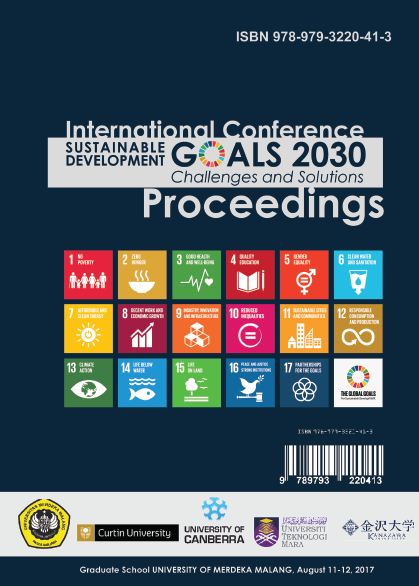The Influence of Gender Leadership of Regional Revenue, the Level of Independence on the Human Development Index Through Direct Expenditure
DOI:
https://doi.org/10.26905/icgss.v9i1.15757Keywords:
Regional revenue, gender leadership, level of independence, development index, and direct expenditure.Abstract
This research was conducted to determine the influence of gender leadership on regional acceptance, the level of independence on the human development index through direct spending. This study uses a quantitative approach. In this research, the variables observed are dependent and independent variables. The dependent variable consists of the Human Development Index and Poverty Level, while the independent variable consists of Gender, Regional Revenue, Level of Independence, and Direct Expenditure. This research uses the census method by taking the entire population, namely 38. Meanwhile, the analysis method used in this research is path analysis using SPSS. Based on the results of the research and data analysis that have been carried out, it can be concluded that gender inequality and regional independence are positive, and regional original income and regional independence are negative and do not have a significant effect on direct spending. Meanwhile, gender inequality is negative, and direct expenditure and local revenue are positive and do not have a significant effect on the human development index. The variables gender inequality, local original income, and regional independence simultaneously have a significant effect on direct spending. The variables gender inequality, local original income, regional independence, and direct spending simultaneously have a significant effect on the human development index. Researchers hope that the results of this research can be used as learning material for intellectuals as well as reference material for future researchers.
Downloads
References
Bakar, A. and Said, S.W. 2021. Analysis of the Level of Independence, Effectiveness and Regional Financial Capability of Mimika Regency. Critical Journal, 5(2): 1-20.
Badrudin, R. (2015). Economics of Regional Autonomy. UPP STIM YKPN.Dzulhijjy, M. I. 2021. Analysis of the Effect of Government Expenditure on the Human Development Index and Pov erty in Terms of Education and Health Levels (Case Study of Yogyakarta Special Region Province).
Jacobsen, J. P., & Harknett, K. (2017). Gender and public finance: Engaging men and women in budgeting and planning. Routledge.
Muhartono, D. S. (2020). The importance of gender mainstreaming regulations in regional development in Kediri Regency. Journal of Social and Political Sciences, 3(2), 117-134.
N, A. F. A. (2019). Analysis of the Effect of Local Revenue, General Allocation Fund, and Capital Expenditure on the Level of Regional Financial Independence in Regency / City Regional Governments in Central Java Province in 2012-2017. Faculty of Economics and Business U.
Nashshar, M. I. (2022). The Effect of Special Allocation Fund on Human Development Index with Capital Expenditure as Mediating Variable. Indonesian Treasury Review Journal of State Finance and Public Policy, 7(3), 255–270.
https://doi.org/10.33105/itrev.v7i3.474
Paramita, O. R. 2021. The Effect of Regional Original Revenue (PAD), General Allocation Fund (DAU), Special Allocation Fund (DAK) on Human Development Index (HDI) in Regency / City of Central Java Province 2015-2018. Thesis. College of Economics Yayasan Keluarga Pahlawan Negara. Yogyakarta.
Putra, P. G. M., & I Gusti Ketut Agung Ulupui. (2015). Local Revenue, General Allocation Fund, Special Allocation Fund, to Improve Human Development Index. E-Journal of Accounting, 11(3), 863-877.
Putra, W. (2019). Indonesian Economy: The Application of Several Theories of Development Economics in Indonesia. PT Rahagrafindo Persada.
Rimawan, M., & Aryani, F. (2019). The effect of village fund allocation on economic growth, human development index, and poverty in Bima Regency. Scientific Journal of Accounting and Humanika, 9(3), 287-295. https://ejournal.undiksha.ac.id/index.php/JJA/a rticle/view/22539
Sarkoro, H., & Zulfikar, Z. (2018). Funds Allocation Special and Local Revenue on Human Development Index ( Study of Empirical on Provincial Governments throughout Indonesia in 2012-2014). Indonesian Accounting and Financial Research, 1(1), 54-63. https://doi.org/10.23917/reaksi.v1i1.1972
Sayifullah, S., & Gandasari, T. R. (2016). The Influence of Human Development Index and Unemployment on Poverty in Banten Province. Journal of Economics-Qu, 6(2), 236255. https://doi.org/10.35448/jequ.v6i2
.4345
Septiawati, A., Sari, Y., & Sopiyan, A. R. (2021). The Effect of Regional Revenue on Direct Expenditure with Moderating Variables of Gross Regional Domestic Product. Province of Lampung. Journal of E-Bis (Economics-Business), 5(2), 279-294
Syamni, G., Husodo, Z., & Syarifuddin. (2014). The Relationship between Local Revenue and Direct Expenditure in North Aceh Regency. Journal of Nationality, 3(5), 11-19.
Women, U. (2018). Local Governance and Gender in Action: A Handbook for Local Elected Leaders. UN Women.
Yulianah, S. (2017). The Effect of Regional Original Revenue Effectiveness, Regional Financial Efficiency, and Financial Independence Against Economic Growth of West Java Province, Fiscal Year 2010-2014. (thesis). Syarif Hidayatullah State Islamic University. Jakarta.
Yuliati. (2018). Public Sector Accounting (3rd ed.). Fourth Edition
Downloads
Published
How to Cite
Issue
Section
License
Copyright (c) 2025 Proceedings of International Conference of Graduate School on Sustainability

This work is licensed under a Creative Commons Attribution-ShareAlike 4.0 International License.
Authors who publish in this journal agree to the following terms: Proceeding of International Conference of Graduate School on Sustainability is licensed under Creative Commons Attribution-ShareAlike 4.0 International. Creative Commons Attribution-ShareAlike 4.0 International License (CC BY 4.0) is applied when mandated by research funders, such as those who have signed. Open Access articles in Jurnal Cakrawala Hukum are published under theCreative Commons Attribution-ShareAlike 4.0 International (CC BY 4.0) license. The copyright of the received article shall be assigned to the journal as the publisher of the journal. The intended copyright includes the right to publish the article in various forms (including reprints). The journal maintains the publishing rights to the published articles. Authors must agree to the copyright transfer agreement by checking the Copyright Notice column at the initial stage when submitting the article.









